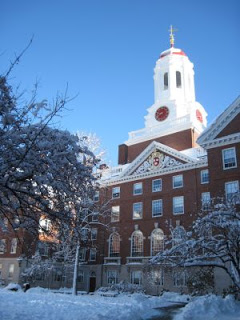| Online: | |
| Visits: | |
| Stories: |

| Story Views | |
| Now: | |
| Last Hour: | |
| Last 24 Hours: | |
| Total: | |
Henry Dunster, Puritans, and Early Baptists
Jonathan Den Hartog
To complete a Puritan trifecta this fall (after this and this), I wanted to focus on a figure that I find fascinating: Henry Dunster.
Henry Dunster would seem to be a prototypical Puritan. He earned his M.A. from Cambridge University and came to Massachusetts Bay in the Great Migration, arriving in 1640. His recorded testimony of conversion, given before Thomas Shepard's Cambridge congregation, fits the typology expected for church membership. He participated in the on-going transatlantic debates in which Puritans in England and America took part.
 |
| Harvard's Dunster House remembers Dunster's service. |
His greatest contribution to Massachusetts Bay was the leading role he took in helping the fledgling Harvard College succeed. Although there had been a previous master, he had mistreated the students before absconding with school funds. Dunster's arrival must have seemed a godsend (literally!) to colonial leaders. Dunster demonstrated intellectual acuity and organizational acumen which rescued the school from oblivion. He also earned a reputation for piety and for counseling his young charges–many of whom went on to be pastors themselves. The promotional piece New England's First Fruits reflects Dunster's leadership at Harvard. As part of the Massachusetts Bay elite, Dunster mingled with John Witherspoon, John Eliot, and other leading ministers.
And then, something changed.
Sometime between 1651 and 1653, Dunster's opinion on infant baptism shifted. He became convicted that adult believers only should be baptized, and so he refused to bring his newborn to the baptismal font. To have such a challenge to Puritan church life come from Harvard, of all places, shook up the colony.
When Dunster's pastor failed to change his mind, Dunster was summoned to a public conference in Boston. There, he defended his position against eleven other pastors and elders who were arguing in favor of infant baptism. Dunster grounded his claims in the explicit teaching of the Scriptures and the logical positions that flowed from them. In this mode, even as he disagreed with Puritan orthodoxy, Dunster demonstrated his Puritan credentials, his desire to reform church and society through the application of scriptural authority.
Despite the logical consistency of Dunster's position, it made no headway with Massachusetts' leaders. The General Court removed him the presidency of Harvard, and mutual recriminations followed. Dunster eventually packed up his large family and moved to Plymouth colony, where he lived out the rest of his life in relative silence.
Dunster's story, to me, points to at least two major issues. The first would be how early Baptists in New England arose out of Puritan impulses. Later generations of leaders in Massachusetts (including Cotton Mather) would find Dunster a difficult figure to discuss, and they often gestured briefly toward his piety before passing along quickly. Still, his life and actions in almost all ways reflected those characteristics that historians have dubbed “Puritan.” It was that very Puritan impulse (biblicist, primitivist, even Ramist) that made him question infant baptism. Although Dunster may have been a unique figure, he suggests how early New England Baptists were not that far removed from the mainstream Congregational churches. They remained Calvinist and orderly. So, even though the “Simple Cobbler of Aggawam” pleaded “that all Familists, Antinomians, Anabaptists, and other Enthusiasts, shall have free Liberty to keep away from us, and such as will come to be gone as fast as they can, the sooner the better,” yet Dunster's beliefs grew from Puritan soil.
The other issue that arises from Dunster's experience is how he sheds light on church and state issues in early Massachusetts. In particular, he shows that baptism was not just a theological matter, it was a political one, as well. The Massachusetts ministers understood the way it created a close tie between church membership and political citizenship. It opened the door for a comprehensive church in Massachusetts–just the model established with the Half-Way Covenant less than a decade later.
Dunster's version of baptism, however, undercut such a vision. It would maintain a pure church at the expense of wide reach. Dunster's challenge to infant baptism was thus simultaneously a challenge to the political arrangements of Massachusetts Bay. In the “Long Argument” within Puritanism, Dunster was opting for purity, even if it meant remaining a sectarian group.
Intrigued? I was glad to see Dunster made a brief appearance in Kidd and Hankins' Baptists in America. Still, for a more in-depth look at Dunster, I would recommend this recent article from the Journal of Church and State.
A Group Blog on American Religious History and Culture
Source: http://usreligion.blogspot.com/2015/11/henry-dunster-puritans-and-early.html





A great many people think groups … not started by Christ are Christian groups … this is obviously wrong.
The baptist … man-made group started in 1606 … in Amsterdam, removing themselves from Christianity
The puritan … man-made group started in 1662 … in England, removing themselves from Christianity
The lutheran … man-made group started in 1517 … in Germany, removing themselves from Christianity
The anglican … man-made group started in 1534 … in England, removing themselves from Christianity
The methodist … man-made group started in 1744 … in England, removing themselves from Christianity
Etc, etc, etc, etc
Popular non-Christian groups like the above listed at > > http://www.Gods-Christian-Dogma.com/section_30.html
Jesus Christ founded the Catholic Church … in 33 A.D. in Jerusalem.
- – - – - – - – - -
C A U T I O N: The Catholic Church has had *zero* … physical properties, priests, and bishops since 8 December 1965 … because of the Sources of Dogma on automatic excommunication for heresy.
Mountains of proof > http://www.Gods-Catholic-Dogma.com/section_12.html
Photographic proof > http://www.Gods-Catholic-Dogma.com/section_13.html
Abjuration of heresy to become Christian > http://www.Gods-Catholic-Dogma.com/section_19.1.html